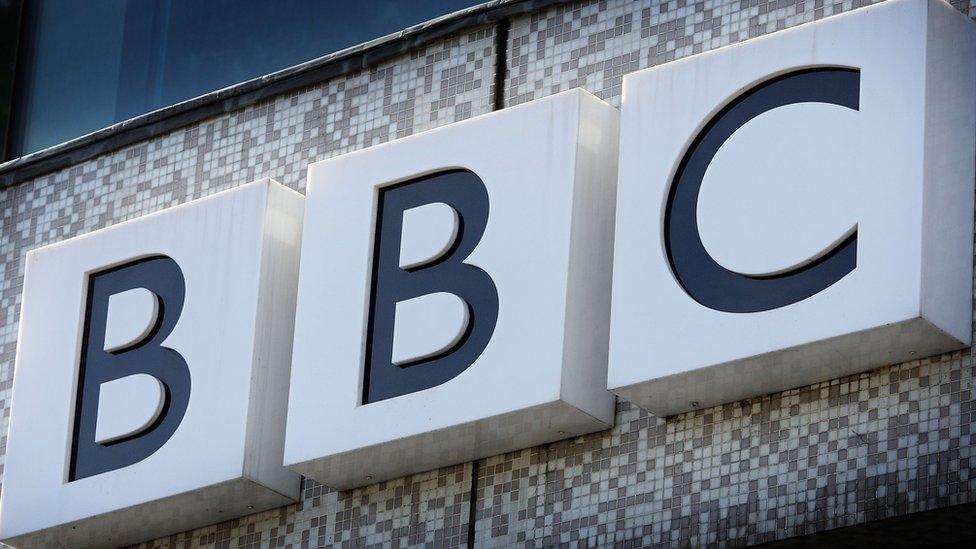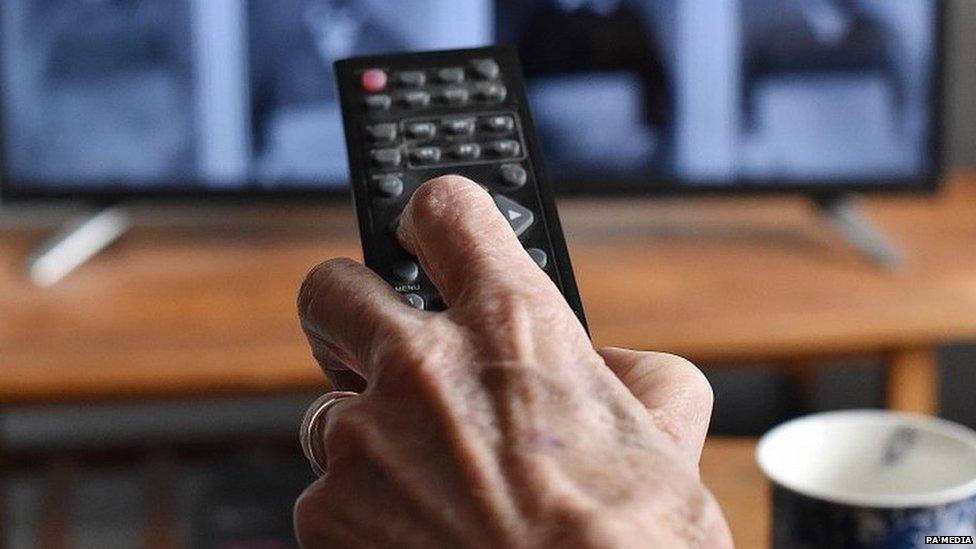BBC licence fee: Tory MPs warn No 10 against fight
- Published
- comments

The BBC is governed by a Royal Charter, which protects the licence fee until at least 2027
Two senior Tory MPs have warned Downing Street not to pick a fight with the BBC amid reports it wants the broadcaster "massively pruned back".
The Sunday Times, external suggested No 10 believed the current licence fee should be replaced by a subscription service and certain channels sold.
Former Tory cabinet minister Damian Green said it would be "foolish" to put public service broadcasting at risk.
He added that the plans were not part of his party's election manifesto.
Huw Merriman, the MP for Bexhill and Battle who is chairman of the all-party parliamentary group on the BBC, warned No 10 against "ramping up an unedifying vendetta" against the BBC, saying the corporation should "not be a target".
"This is not a fight the BBC is picking nor a contest my party promised if we got elected," he wrote in the Daily Telegraph. "If the BBC ends up in decline, it will be the government which will be accused by the very people we will rely on for support at the next election."
Asked about the government's plans at a press briefing on Monday, a No 10 spokesman said individual services were a matter for the BBC but the PM was on the record as saying the future of licence fee needed "looking at".
During the election campaign Boris Johnson questioned whether the BBC's long-standing funding model still "made sense" given the growing popularity of on-demand streaming services like Netflix.
The PM, who worked for many years as a journalist for rival organisations such as The Telegraph Group and The Spectator, said it remained to be seen whether requiring people to pay a flat fee for a single's broadcaster's output was "justified".
Ministers recently launched a consultation on whether non-payment of the licence fee should remain a criminal offence.

About 95% of the UK's 27 million households pay the licence fee
Referring to sources quoted in the Sunday Times piece, Mr Green said: "The unattributed source was quoted as saying, 'we're going to have a consultation and then we're going to whack the BBC.' That tells me the consultation isn't a real one and there are legal implications about that."
He added that his views are shared by MPs "across the House of Commons", saying that while many are "permanently irritated with the BBC and accept that the BBC does things that are stupid and is occasionally arrogant," they agree "that nevertheless, it's an institution worth defending".
Many MPs say those who are unwilling or unable to pay the compulsory fee - which from April will rise by £3 to £157.50 a year - should not be prosecuted. The BBC has warned such a change could have a significant impact on its finances and potentially put some of its output at risk.
The Conservatives' election victory has triggered a wider debate about how the BBC should be funded in future and whether the licence fee, which is protected in law until 2027 when the BBC's current Royal Charter ends, is still the best model.
During the campaign Boris Johnson, who worked for the Daily Telegraph, Spectator and other titles during a 30-year career in journalism, said the licence fee looked outmoded and its abolition needed "looking at".
The Sunday Times reported senior aides as saying the PM was "really strident" about the need for major changes at the BBC. It said there was support in No 10 for the broadcaster being downsized and to sell off the majority of its 61 national and local radio stations.
BBC chairman Sir David Clementi has warned that putting the broadcaster's services behind a paywall would lessen its ability to "bring the country together".
More than 100,000 people have signed a petition calling for an end to "political attacks" on the BBC and for politicians to support the role the BBC "plays in independently holding the government to account".
But other Conservatives said the BBC must "get its house in order" if it wanted to continue in its current form.
Simon Hoare, chairman of the Northern Ireland select committee, said the broadcaster must immediately reverse its decision to remove free TV licence from millions of over-75s. from this June.
Allow X content?
This article contains content provided by X. We ask for your permission before anything is loaded, as they may be using cookies and other technologies. You may want to read X’s cookie policy, external and privacy policy, external before accepting. To view this content choose ‘accept and continue’.

And Jonathan Gullis, the MP for Stoke-on-Trent North, described the licence fee as "outmoded" and said there were alternative models including funding services through advertising.
He told BBC Radio Stoke that while he was a big supporter of local radio, the taxpayer should "not necessarily have to fund it all".
Asked on Monday whether the broadcaster would be told to shut down some of its channels, a Downing Street spokesman said: "How the BBC is run is a matter for the BBC."
He added: "I would point you to what the prime minister has said on this before, which was 'at this stage we are not planning to get rid of all licence fees, though I am certainly looking at it'."
Labour's shadow culture secretary Tracy Brabin called on new Culture Secretary Oliver Dowden, who was appointed in last week's reshuffle, to "speak up for" public service broadcasting and ensure the BBC remained "fit for the future".